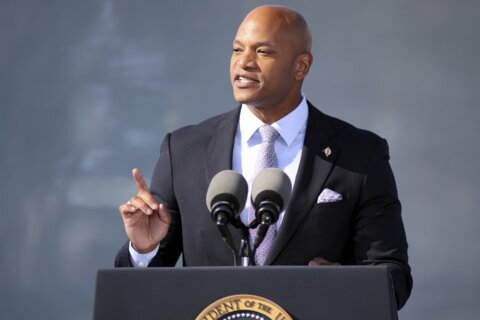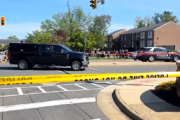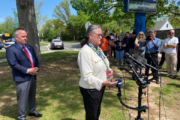Maryland Gov. Wes Moore, who just returned from a seven-day economic mission to Japan and South Korea, joined WTOP on Wednesday to talk about what he got out of the trip.
The governor got a chance to ride the high speed magnetic train, Japan’s Maglev, during his time overseas.
Moore spoke to WTOP’s Shawn Anderson and Anne Kramer about everything from tariffs to a potential presidential run in 2028.
- Shawn Anderson:
When it was announced back in March that you and the Maryland Delegation were headed to Japan and South Korea, you said you weren’t leaving Maryland without bringing some new opportunities back with you. So what opportunities did you bring back, and will they actually ever become a reality?
- Gov. Wes Moore:
They will. They already are, in many ways. And it was a very successful trip. We went over there with a core focus that we have to use this as a way of both growing our economy, and when I say growing the economy, I meant focusing on the three lighthouse industries that I laid out before: which is life sciences, IT and aerospace and defense. And also, we had to diversify off of Washington.
Our economy is too tethered to Washington, D.C., and when you’re watching the kind of economic chaos that the new administration is putting on board, we have to find ways of moving faster and getting things done. And by going over to Japan, to Korea, and being able to meet with some partners that are already doing work in Maryland, like Hitachi, but also talking to large companies and entrepreneurs who are now — we’re already in conversations — bringing more work, jobs and opportunity to Maryland. We’re just very grateful for what I think was a very successful trip,
- Anne Kramer:
Governor, you talked about speed. You got to take in some speed when you rode the Maglev, the magnetic train. And something that so many Maryland leaders before you’ve been trying to bring to our state for decades now, is Maglev. What inroads did you make there with the project?
- Wes Moore:
Well, it’s an impressive technology. The thing that I continue to realize, is it’s that it’s not new. It’s been going on there for 50 years, and it’s not risky. They’ve had 50 years and really have not had a single injury or casualty with a train that is moving north of 300 miles an hour, where you can get from Baltimore, for example, to D.C. in just 16 minutes.
And so it is a really innovative and interesting technology. I also know that nothing can be done or will be done without community support and community buy-in. Nothing can or will be done unless it also has federal government support, because the federal government also has to serve, just with any mass project like that, as one of the largest underwriters.
So there’s a lot of things that would have to be done for this to become a reality, but there’s absolutely no doubt that it’s an impressive technology.
- Shawn Anderson:
How much talk was there about President Trump’s tariffs with the nation’s leaders that you met with? What are they worried about?
- Wes Moore:
I met with cabinet ministers, I met with the interim president of Korea while I was over there, and the issue of the tariffs and the uncertainty that it has caused came up in every single conversation, because it’s very difficult to do long-term planning when, just in the time when I was in Asia, I think the policy toward many, many Asian countries changed two and three times — just in the time that I was over there.
So there’s the erratic nature of this decision-making is having very real human consequences, both here in Maryland, with our farmers in the Eastern Shore and our port workers in Baltimore, but also with large multinational corporations that are doing work inside of the state of Maryland.
There was not just a frustration; I almost parallel it to when I got in trouble when I was young with my mom, and I’d ask her, ‘Are you upset?’ And she said, ‘I’m not upset. I’m just disappointed.’
And I think that’s what you’re hearing from a lot of leaders in Japan and Korea. It’s just a measure of disappointment with the way the decisions are being made here among the federal government.
- Anne Kramer:
Governor, back in Annapolis, you signed a bunch of bills into law, including the Second Look Act. It has been controversial. Tell us about why you think this law was necessary, and how do you ease the minds of worried crime victims now that it’s going to become a law here?
- Wes Moore:
I wrestled deeply with the bill, and I think there was a few things that made me comfortable signing the bill. The first was, I do believe in second chances, and I believe that we should be a society that does offer second chances, that nobody is perfect, and no one has lived a perfect life. And so we do need to have open hearts.
And I think that’s also just my faith beliefs that believes that. I also know this though, that with the way the bill is constructed, not only are there some specific exceptions of people. So if you do something that hurts law enforcement, for people that are in jail for life without parole, for people that do things to children, or sexual abuse, or that type of thing — you’re not eligible for this bill.
This said, the other piece though, is it doesn’t mean automatic. It means you now have the opportunity to petition, to go in front of a judge and make your case heard. So in no way, shape or form is this an automatic opening or an automatic reentry back into society. It just simply means that — as long as you don’t fall under many of these specific criteria that are laid out, the most violent, and the most of the most destructive — you have a chance to petition in front of a judge to have your case heard.
- Shawn Anderson:
There continues to be so much debate about what Democrats are doing or not doing to try to push back against President Trump. Your name is still swirling and even gaining traction as the possible presidential candidate in 2028. Are you planning to run for president in 2028?
- Wes Moore:
I am not running for president in 2028 and I’m really excited about reelection in ’26.
I think that we’ve got a great story to tell. I’m thankful for the fact that people around the country noticing that we have helped to lead Maryland to now having historically-low unemployment rates — where we went from 43rd in the country to now having 15 months of the lowest unemployment rates in the entire country.
I’m proud of the fact that people around the country are noticing that we have had historic drops in violent crime — where Maryland is literally helping to lead the country in terms of everything from homicides to nonfatal shootings to carjackings to assault, juvenile crime.
I’m proud of the fact that we are seeing economic growth happening in Maryland for the first time in a decade. Population increases for the first time in a decade. Started new businesses happening for the first time in a decade.
So people are noticing that Maryland’s just moving differently than the rest of the country, and I’m thankful for that and I’m looking forward to going back in front of the people of Maryland in 2026 and making my case.
Get breaking news and daily headlines delivered to your email inbox by signing up here.
© 2025 WTOP. All Rights Reserved. This website is not intended for users located within the European Economic Area.






